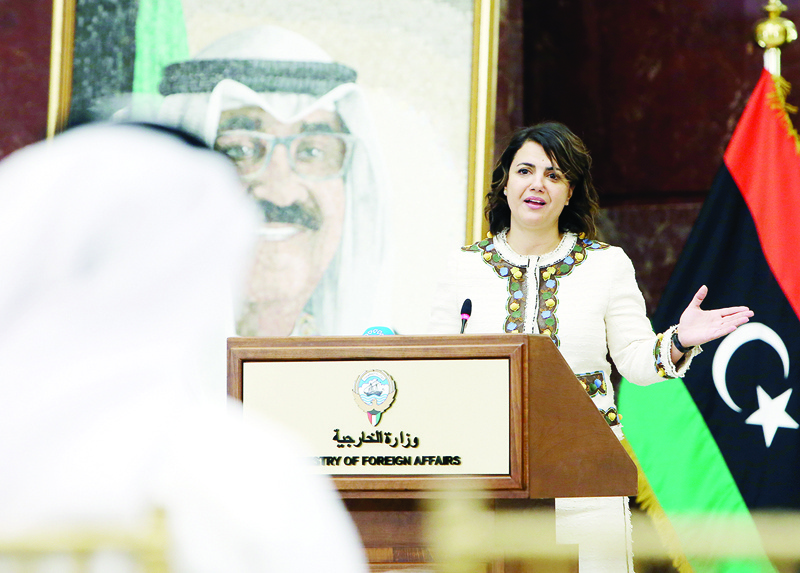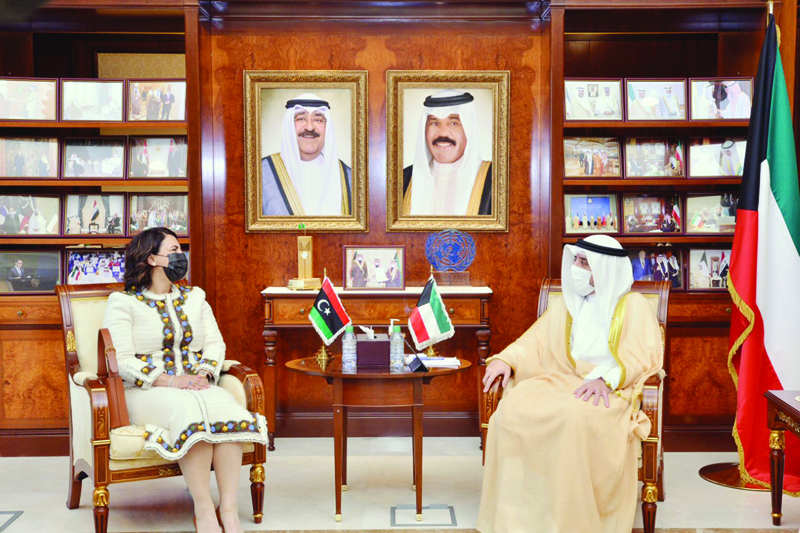 KUWAIT: Libya's foreign minister Dr Najla Mangoush speaks during a press conference in Kuwait yesterday. - Photo by Yasser Al-Zayyat
KUWAIT: Libya's foreign minister Dr Najla Mangoush speaks during a press conference in Kuwait yesterday. - Photo by Yasser Al-ZayyatKUWAIT: Kuwait's Foreign Minister and State Minister for Cabinet Affairs Sheikh Dr Ahmad Nasser Al-Mohammad Al-Sabah met with his Libyan counterpart Dr Najla Mangoush yesterday. During the meeting, the Kuwaiti minister affirmed Kuwait's keenness on helping Libya complete its transitional phase and hold its general elections on December 24, 2021. Meanwhile, the Libyan official praised Kuwait's efforts in supporting Libya and the region. In addition, both sides also discussed the historic bilateral ties between Kuwait and Libya, ways of enhancing those ties, in addition to latest regional and international developments.
Libya's foreign minister had said yesterday that some foreign fighters have left the country as the unity government seeks to marshal international help to withdraw the many who remain. "The reports are correct. There is a very modest start," Mangoush said at a news conference in Kuwait when asked whether some foreign fighters had been removed.
 This handout photo released by Kuwait's Foreign Ministry yesterday shows Foreign Minister Sheikh Dr Ahmad Nasser Al-Mohammad Al-Sabah meeting with his Libyan counterpart Dr Najla Mangoush.
This handout photo released by Kuwait's Foreign Ministry yesterday shows Foreign Minister Sheikh Dr Ahmad Nasser Al-Mohammad Al-Sabah meeting with his Libyan counterpart Dr Najla Mangoush."We are still seeking a larger and comprehensive organization for the exit of mercenaries," she said. Libya's warring sides, backed by regional powers, remain entrenched with allied foreign mercenaries along front lines in defiance of a ceasefire agreement. Any more significant withdrawal of foreign mercenaries has appeared far off amid arguments over the role of regional forces allied to each side and stumbles in efforts to agree ground-rules for a national election.
There has been little peace or security in Libya since the 2011 NATO-backed uprising that ousted Muammar Gaddafi. The country split between warring eastern and western factions in 2014. Eastern forces were backed by the United Arab Emirates, Russia and Egypt. The previous government in Tripoli, in the west, which was recognized by the United Nations, was supported by Turkey.
The warring sides brought in mercenaries, including via Russia's Wagner group, from Syria, Sudan and Chad among other countries, the United Nations has said.
Last year, after commander Khalifa Haftar's eastern-based Libyan National Army (LNA) was pushed back from its 14-month assault on Tripoli, the two sides agreed on a truce and accepted the installation of a new unity government in Tripoli. The ceasefire agreement called for all foreign mercenaries to be withdrawn within three months of its being signed a year ago.
The head of Libya's presidency council said last month it would take part in a conference to ensure "unified, consistent" international support and restore a sense of Libyan leadership and ownership over the country's future. But Mohammed Al-Menfi also warned of "serious challenges" that could undermine national elections planned for December 24. - Agencies










